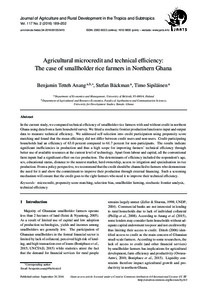Aufsatz

Agricultural microcredit and technical efficiency: The case of smallholder rice farmers in Northern Ghana
Zusammenfassung
In the current study, we compared technical efficiency of smallholder rice farmers with and without credit in northern Ghana using data from a farm household survey. We fitted a stochastic frontier production function to input and output data to measure technical efficiency. We addressed self-selection into credit participation using propensity score matching and found that the mean efficiency did not differ between credit users and non-users. Credit-participating households had an efficiency of 63.0 percent compared to 61.7 percent for non-participants. The results indicate significant inefficiencies in production and thus a high scope for improving farmers’ technical efficiency through better use of available resources at the current level of technology. Apart from labour and capital, all the conventional farm inputs had a significant effect on rice production. The determinants of efficiency included the respondent’s age, sex, educational status, distance to the nearest market, herd ownership, access to irrigation and specialisation in rice production. From a policy perspective, we recommend that the credit should be channelled to farmers who demonstrate the need for it and show the commitment to improve their production through external financing. Such a screening mechanism will ensure that the credit goes to the right farmers who need it to improve their technical efficiency.
Zitierform
In: Journal of Agriculture and Rural Development in the Tropics and Subtropics. Kassel : Kassel University Press. - Vol. 117, No. 2 (2016), S. 189-202Sammlung(en)
Vol 117, No 2 (2016) (Journal of Agriculture and Rural Development in the Tropics and Subtropics (JARTS))Zitieren
@article{urn:nbn:de:hebis:34-2016061350415,
author={Anang, Benjamin Tetteh and Bäckman, Stefan and Sipiläinen, Timo},
title={Agricultural microcredit and technical efficiency: The case of smallholder rice farmers in Northern Ghana},
year={2016}
}
0500 Oax 0501 Text $btxt$2rdacontent 0502 Computermedien $bc$2rdacarrier 1100 2016$n2016 1500 1/eng 2050 ##0##urn:nbn:de:hebis:34-2016061350415 3000 Anang, Benjamin Tetteh 3010 Bäckman, Stefan 3010 Sipiläinen, Timo 4000 Agricultural microcredit and technical efficiency: The case of smallholder rice farmers in Northern Ghana / Anang, Benjamin Tetteh 4030 4060 Online-Ressource 4085 ##0##=u http://nbn-resolving.de/urn:nbn:de:hebis:34-2016061350415=x R 4204 \$dAufsatz 4170 7136 ##0##urn:nbn:de:hebis:34-2016061350415
<resource xsi:schemaLocation="http://datacite.org/schema/kernel-2.2 http://schema.datacite.org/meta/kernel-2.2/metadata.xsd"> 2016-10-04T08:27:48Z 2016-10-04T08:27:48Z 2016-09-20 1612-9830 2363-6033 urn:nbn:de:hebis:34-2016061350415 http://hdl.handle.net/123456789/2016061350415 eng Kassel University Press Urheberrechtlich geschützt https://rightsstatements.org/page/InC/1.0/ microcredit propensity score matching selection bias smallholder farming stochastic frontier analysis technical efficiency 630 Agricultural microcredit and technical efficiency: The case of smallholder rice farmers in Northern Ghana Aufsatz In the current study, we compared technical efficiency of smallholder rice farmers with and without credit in northern Ghana using data from a farm household survey. We fitted a stochastic frontier production function to input and output data to measure technical efficiency. We addressed self-selection into credit participation using propensity score matching and found that the mean efficiency did not differ between credit users and non-users. Credit-participating households had an efficiency of 63.0 percent compared to 61.7 percent for non-participants. The results indicate significant inefficiencies in production and thus a high scope for improving farmers’ technical efficiency through better use of available resources at the current level of technology. Apart from labour and capital, all the conventional farm inputs had a significant effect on rice production. The determinants of efficiency included the respondent’s age, sex, educational status, distance to the nearest market, herd ownership, access to irrigation and specialisation in rice production. From a policy perspective, we recommend that the credit should be channelled to farmers who demonstrate the need for it and show the commitment to improve their production through external financing. Such a screening mechanism will ensure that the credit goes to the right farmers who need it to improve their technical efficiency. open access In: Journal of Agriculture and Rural Development in the Tropics and Subtropics. Kassel : Kassel University Press. - Vol. 117, No. 2 (2016), S. 189-202 Anang, Benjamin Tetteh Bäckman, Stefan Sipiläinen, Timo Gedruckte Ausg. im Verlag Kassel Univ. Press (www.upress.uni-kassel.de) erschienen. </resource>
Die folgenden Lizenzbestimmungen sind mit dieser Ressource verbunden:
Urheberrechtlich geschützt

